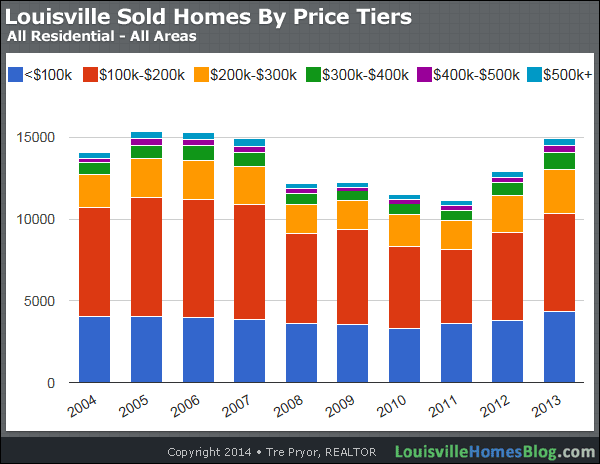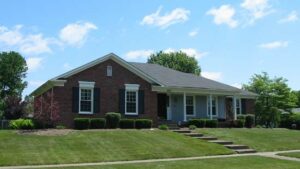It’s always interesting to slice and dice the data in different ways to see what I may learn about the Louisville real estate market. Like an experiment, but without the goggles or beakers.

I wanted to see how the housing recession and subsequent recovery, have affected Louisville home sales. I’ve divided the price tiers with the following people groups: first-time homebuyers, move-up families, second-stage families, and luxury buyers.
So, let’s look at each group!
Louisville First-Time Home Buyers
I went back 10 years to compare how homes under $100,000 sold over time. Here are the results.
Year Number Change 2004 4053 2005 4059 +0.1% 2006 3987 -1.8% 2007 3872 -2.9% 2008 3600 -7.0% 2009 3563 -1.0% 2010 3294 -8.5% 2011 3626 +10.1% 2012 3773 +4.1% 2013 4332 +14.8% Louisville Sold Homes under $100,000. Residential only. All Areas.
The 2005-06 years were the highest for all Louisville home sales and you can see here that the number of lower-priced homes, ones typically purchased by first-time homebuyers had already started to decline beginning in 2006.
2011 is a strange year. The total number of Louisville sold homes during this year was at its lowest point in a decade but for this tier it realized double-digit gains.
Very interesting to note that for 2013, this lowest price tier hold its highest overall percentage of the real estate market.
Move-Up Families
These category names are highly generalized, as many first-time home buyers can and do purchase properties over $100,000. But it does give us an idea the kind of people that might be in each range.
Year Number Change 2004 6629 2005 7277 +9.8% 2006 7181 -1.3% 2007 7013 -2.3% 2008 5493 -21.7% 2009 5772 +5.1% 2010 5029 -12.9% 2011 4487 -10.8% 2012 5417 +20.7% 2013 5993 +10.6% Louisville Sold Homes $100,000-$200,000. Residential only. All Areas.
While the under $100k homes saw a slight decline in 2009 this price tier saw a fairly sizeable increase of 5.1%. Only to see that the number of Louisville-sold homes drop by double digits in the next two years.
The increases are larger and so are the drops.
Keep in mind, massive sociological pressures are affecting all these numbers such as unemployment rates, increasing energy costs, and inflation, just to name a few.
Second-Stage Families
Homes that are priced between $200,000-$400,000 are almost always purchased by a person or family who has already purchased a home before. These properties represent a more established homeowner, one who is likely to remain in this home for many years.
Combining the orange and green bars in our chart (above) we get the following data.
Year Number Change 2004 2757 2005 3187 +15.6% 2006 3305 +3.7% 2007 3208 -2.9% 2008 2482 -22.6% 2009 2395 -3.5% 2010 2622 +9.5% 2011 2432 -7.2% 2012 3037 +24.9% 2013 3737 +23.0% Louisville Sold Homes $200,000-$400,000. Residential only. All Areas.
What stands out to me in this dataset is the massive increase in Louisville sold homes starting in 2012 and roughly duplicating the same feat the following year of 2013. Moving from 2,432 homes sold and two years later selling 3,737 is a whopping 53.7% increase.
Dramatic, to say the least.
In fact, there were more homes sold in this price tier last year than for any year in our survey, even the so-called “glory days” of real estate, 2005-06.
Louisville Luxury Buyers
Last but not least, our final group covers Louisville sold homes $400,000 and up, that we’ve labeled Louisville luxury buyers.
Year Number Change 2004 633 2005 825 +30.3% 2006 815 -1.2% 2007 833 +2.2% 2008 582 -30.1% 2009 480 -17.5% 2010 551 +14.8% 2011 562 +2.0% 2012 681 +21.2% 2013 865 +27.0% Louisville Sold Homes over $400,000. Residential only. All Areas.
Here’s a price tier where the original chart doesn’t tell the whole story. Those slices are just to thin!
When looking at the percentage change, Louisville luxury home sales fluctuated wildly in the past 10 years, with 2009 being the low point (as expected) and 2013 being high (a bit of a surprise).
Conclusion
I think the takeaway from this experiment is that while first-time home buyers are now making up the largest portion of the Louisville real estate market in the past decade, the overall market is greatly improved during the last two years.
Not just improved but grew dynamically.
Looking forward, it appears that 2014 is off to a bit of a shaky start. To finish as strong as last year, we’re going to have to get on our horses!



